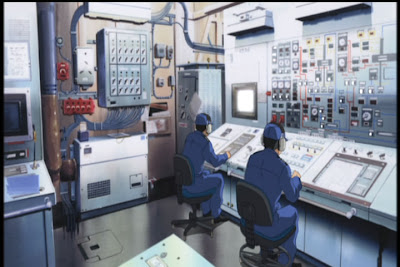
So I'm stonewalled for the next two months until the final release arrives. Still, with a DVD titled Return to the Future, we might suppose that there may yet be some time travel involved. I'm a bit displeased that the final two DVD's have three episodes each, are devoid of extras, yet cost the same as all the others. It's a reality of the cost of physical media that will have to be tolerated for a while yet.
Update: I went ahead and got spoilers. There is no definitive ending, and it's not a life goes on kind of ending, either. I despise you marketing people.
With the last three episodes, it's hinted that war becomes more of a setting for an adventure story and less of a theme or message, should there ever be a sequel. Zipang could certainly use one (manga is still ongoing, too), perhaps in a shorter 13 episode run or OVA.
A lot can happen in the last three episodes and if warranted, another entry will go up after finishing the series.
First off, this series exposes the thinking and military doctrine of Japanese World War II commanders. Suicide instead of accountability; human spirit instead of superior numbers, logistics, and firepower; over-extension and inability to consolidate gains; bickering between the army and navay; these are a few of the elements that contributed to the unraveling of Japan's military machine.
On the flip side, the Americans are portrayed as brash (but there are mitigating circumstances) but invariably confused by the presence of the Mirai and its equally un-orthodox (for the time) threats.
What Zipang is not, is a recognition of Japan's mistreatment of everyone not Japanese. Saying that "all blood is red" and other positive sentiments is great, but there is little depiction of anyone other than Japanese and Americans. Zipang does well to ignore those messy bits, keeping the action focused on the conflict between Japan and America and the avoidance of conflict. And to end the war, Kusaka is willing to give up the colonization of much of south Asia because the crucial resource, oil, can be found - where else? - in China. No sir, Kusaka's ideal Japan is not devoid of imperialist ambitions.
The driving force behind most of the character and story development is the conflict between war-time sentiment and the ideals that followed 60 years on. The crew of the Mirai are frequently held hostage by their mission of self-defence, rescue, and initial struggles to keep history unchanged. Their reluctance to have anyone killed lets them be manipulated by Kusaka, leading directly to the events surrounding Guadalcanal, and they take casualties in a forced demonstration of their anti-air capabilities during an American air raid.
I have the least sympathy for Kadomatsu. He's a tool, basically Kusaka's lackey for the first half of the series, followed by poor decision making in the latter half. Yanagi was evidently unfit for ground operations; his tubby look might have had something to do with that but that was conveniently overlooked. He decided to board the "escort" submarine fully aware that Taki was sketchy as hell, and that the plane must have taken off from a carrier. Even though the crew of the Mirai are continuously burned by their willingness to trust, Kadomatsu is the lead lemming, and should have been overruled by the demonstrably wiser captain on multiple occasions.
The right way is not always the easiest, but while it's commendable that the Mirai adheres to its guiding principals when at all possible, they refuse to acknowledge that they are in Rome. World War II personnel do not know the definition of deterrence, which necessarily grew out of the Cold War's policy of Mutually Assured Destruction. Related to that, no one knew what peacekeeping was, which was only introduced by post-war Canada.
Having never truly appreciated (and mostly never witnessed) the accuracy, range, and destructive power of post-Cold War armament, it's no surprise that the Americans do not back down, and it is only because Kusaka has seen an ASROC launch up close that the Mirai can bluff their way out of a confrontation with the Yamato.
What should you expect to see in Zipang? You get to witness an anti-war message, conspiracy plot, and the success and infuriating mistakes of an inexperienced (and naive) crew aboard a destroyer that should not be equipped with Tomahawk cruise missiles. The self-defence imperative is there but is not used as a stick with which to beat the viewer over the head. It's woven into a fairly engaging story, treating all combatants involved with respect.
Just don't expect the Korean labourers at Guadalcanal to receive any love.

1 comments:
"Kusaka is willing to give up the colonization of much of south Asia because the crucial resource, oil, can be found - where else? - in China. No sir, Kusaka's ideal Japan is not devoid of imperialist ambitions."
Actually, Manchuria, which had already long been annexed by Japan, and was considered essentially a part of that nation. See, for example, the excellent trilogy, "The Human Condition."
And I just watched the last disc, and am incredibly let down that (a) there was no resolution and (b) there is no immediate sequel.
Color me :-(
Post a Comment